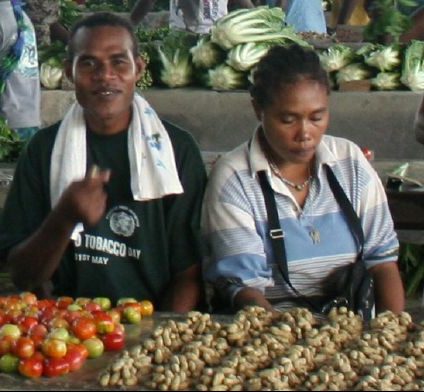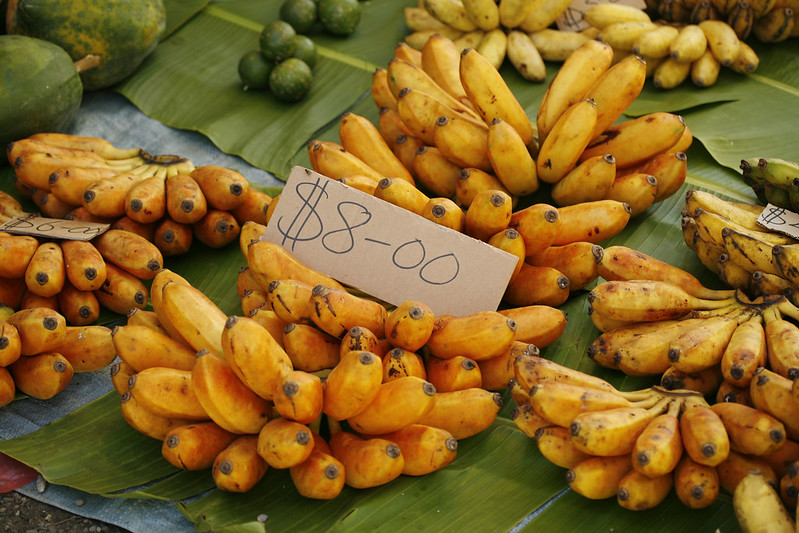Solomon Islands: How the Barana Community is preparing for Covid-19
Solomon Islands: How the Barana Community is preparing for Covid-19
Until now, the Solomon Islands have not had any COVID-19 cases; but an emergency lockdown declared by the Governor General has affected communities - such as the small village of Barana. John Walenenea Jr reports. This is the seventh in a series of stories from 'Voices from the Frontline' by ICCCAD and CDKN.
The Barana Nature and Heritage Park is the biggest conservation site adjacent to the capital city of Honiara in Guadalcanal, Solomon Islands. It is owned by the Barana community and has rapidly developed environmentally sustainable enterprises since its establishment in 2017. The most common livelihood option for the community is traditional agriculture. Household members grow fresh produce in their respective gardens and sell them in the central market outside their village.
Confusion began to brew among the community members in Barana regarding COVID-19, as knowledge of the virus was primarily accessed through radio and television.
“The lockdown measures such as social distancing, prescribed by the government, confused our community because we are only used to cyclone warning protocols,” says Jerry Mane, who works as the Programme Coordinator at the Heritage Park. Live and Learn, a non-governmental organisation, visited the community to provide education on COVID-19, but the residents felt that the data was insufficient and lacked important health-based information.
As more and more community members learned about the severity of the disease in other parts of the world from the media, they started comparing the crisis to the world wars. Despite the initial disorientation surrounding COVID-19, the Barana community soon began taking steps to protect themselves. “As the virus transmission is active in public spaces, we wanted to create a roadblock to protect ourselves from outsiders coming into our community. We would only allow the Red Cross, the police, and other essential workers to enter, that too in case of an emergency,” says Benjamin Dadai, a school teacher at the Barana community.
Peanuts vendor (c) Antony Robinson
Community women’s market
As the lockdown took its course, markets were shutting down and the transport system was disrupted. Since the community is predominantly agricultural, such disruptions hampered the residents’ overall income-earning activities. To take matters into their own hands, the community members set up a makeshift market to sell fresh produce from their gardens. The women of the community are the primary sellers in this village makeshift market. A roster has been developed for the women to take turns and sell their produce to avoid over-supply and waste.
An added benefit of the village market for the women is its proximity, which allows them to save on transport and other associated costs of setting up space in the central market. The Community Women’s Market, as it is being called, has brought success to the Barana community. The market was initially promoted on social media and garnered interest from residents in Honiara, who come to the community to access fresh produce. The lack of competition has led to increased income for these women, an issue that they had to deal with in the central market.
“The agriculture sector is getting stronger as the women’s market has boosted local farming. I see an increasing number of people coming here due to the closure of many markets in Honiara,” says Melinda Kii, the administrator of the Nature Park, who also helped to connect the women’s market to customers outside the community. The initiative has received support from Solomon Tobacco, which donated 15000 seeds to the community.
Customers are encouraged to practise social distance measures while shopping, hence addressing the concerns of the ongoing threat of the COVID-19 crisis. “Everyone is appreciating this big change that has helped to improve the overall income of the community,” says Peter Tabiru, founder of the Barana Nature and Heritage Park. Garden farming at household level is a way of living and also a form of self-sufficiency for the residents of Barana. In the case of any COVID-19 infections arising within the community, the residents will be able to feed their own families and survive.
Image (below) - John with Jerey and Benjamin.
Healthcare and hygiene
While the agricultural sector is flourishing in the community, there remain grave development concerns of a different sort. There is a strong need for healthcare and sanitation facilities, with only open toilet facilities being available. Moreover, the lockdown disallows residents to travel out of their village which is worrisome, given that there are no healthcare facilities in the Barana community. “We do not have a community clinic, so we have to travel to Naha or Vura Clinic, or the National Referral Hospital in Honiara to access medical facilities. In addition, our roads have also deteriorated after Cyclone Harold and is in a worse state than before,” shares Melinda. As a consequence, healthcare facilities are only accessed when a patient is critically ill and is in need of intensive care.
Additional reliance on a water stream and rainwater for watering crops, and for health and sanitation purposes is key. “Water is our main problem. We are lucky that we have a stream surrounding the whole community, on which we depend besides rain water. However, we recently located a borehole situated in the middle of the village. We will soon work on that,’ adds Melinda. Furthermore, the schools in the community are yet to have proper toilets and hand washing facilities available for teachers and students.
Impact on education
Schools in the community had been closed due to the lockdown but have recently been directed to open. It has been decided that classes will be taught in two shifts, one in the morning and the other in the afternoon to adhere to the social distancing measures. However, this is not met without challenge. It has been observed that children lose their interest to participate in school activities in the afternoon, and accommodating students in the small classrooms through maintaining distance protocols, despite the double shifts, is tough. Regardless of the demerits, teachers continue to advocate to operate the school by maintaining social distance, and are addressing the lack of financial capabilities to provide essential hygiene. “We, the teachers, have attended meetings at the Ministry of Education to discuss necessary preparedness and responses, and have submitted a checklist of materials that are required for the schools to operate during COVID-19,” Benjamin shares.
Mental health
Apart from the more evident health, social and economic consequences of the pandemic, the impact on mental health is also rampant. Benjamin shares with us that watching the news on television has led to anxiety, and he suffers through many sleepless nights thinking about the pandemic. But in spite of COVID-19 fears looming over the small community of Barana, its residents share a positive attitude. “Though we are lucky and as we are yet to record a single COVID-19 positive case, we cannot predict the future. We continue to live as per normal, but the concern nags away at the back of our minds. We hope to prepare ourselves in the best possible way with what little we have. That is all I can say right now,” concludes Benjamin.
Interviewer’s perspective
According to the Barana community, the crisis brought on by COVID-19 is a strange one. During natural disasters that have struck the islands in the past, community members worked together to build resilience and shield themselves from the consequent impacts. But it seems that the virus demands the opposite because of its contagion factor. Peter Tabiru built an isolation hut in his garden in case anyone in his family is infected but he is not sure of such individual initiatives amongst other members of the community. Despite concerns regarding preparedness for the COVID-19 crisis, the Barana community hopes to respond to it to the best of their abilities.
About the interviewer
John Walenenea Jr has a Bachelor of Science in Marine Science (2009), a Post Graduate Diploma in Climate Change and Sustainable Development (2014), and a Master of Science in Environmental Science (2019). Currently, John is working with the USP- EUGCCA Plus PACRES Project.
About the interviewees
Peter Tabiru, Benjamin Dadai, Jerry Mane and Melinda Kii all live in the Barana community in Guadalcanal, in the Solomon Islands. Melinda Kii started off as the chairlady, then manager and is currently the administrator of the Barana Nature and Heritage Park. She is also a freelance researcher. Peter is the chairman of the Nature Park as well as the President of the Council of Chiefs in the community while Benjamin is an early childhood teacher. Both of them are also farmers along with Jerry. The Barana community predominantly depends on crop production for daily subsistence, and very few have alternative livelihood options.
Read more of the ‘Stories from the frontline of COVID-19’ with ICCCAD and CDKN:
- ‘Lockdown slum style’ – An interview with Sheela Patel of Slum Dwellers International (June 2020)
- Bangladeshi farmers respond to COVID-19 with innovation (June 2020)
- Women’s group boosts resilience in the face of crisis (June 2020)
- Fiji community voices highlight lessons and opportunities for resilience (June 2020)
- Rafiq Nagar, Mumbai – Residents confront COVID-19 on top of existing health threats (July 2020)
- Dhaka, Bangladesh - How one woman's idea unleashed a community's spirit (July 2020)



